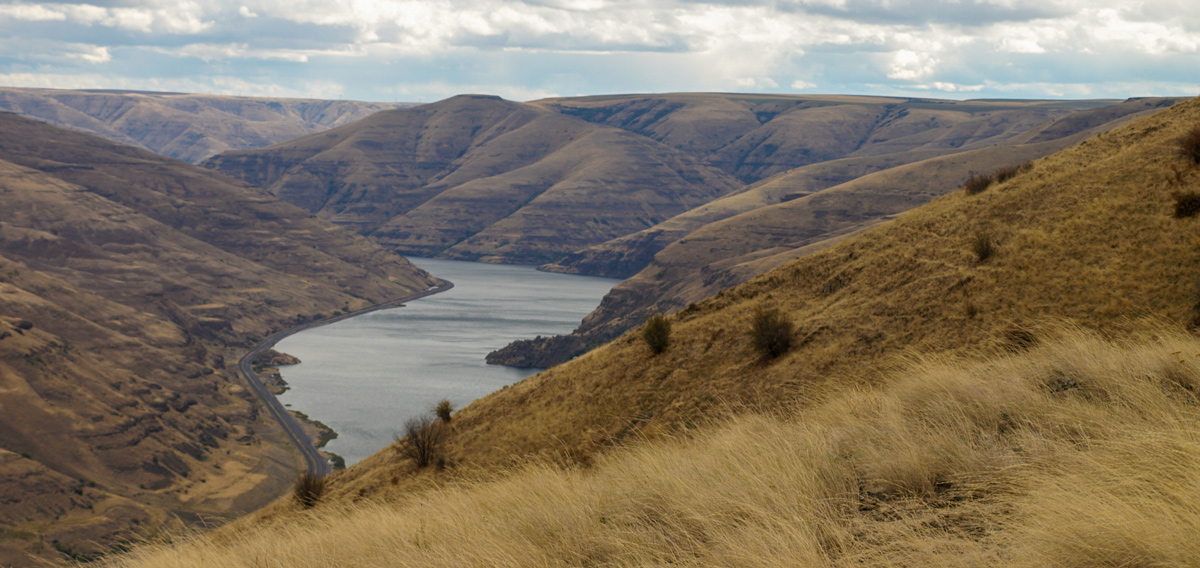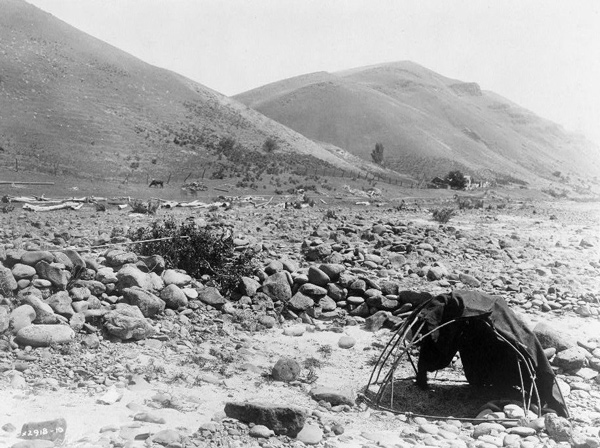Between present Clarkston and Almota, Washington, the paddlers navigate numerous Snake River rapids where the Nez Perce and Palouse have established fisheries. The captains buy salmon and dogs and notice a curious sweat lodge.
In Santa Fe, governor Real Alencaster recommends that a military force stop the Lewis and Clark Expedition.
A Curious Sweat Lodge
by Yellowstone Public Radio[1]Originally aired weekdays by Yellowstone Public Radio during the Bicentennial observance of 2003-2006. Narrated by Hal Hansen. Scripts by Whit Hansen and Ed Jacobson. Produced by Leni Holliman. © … Continue reading
Barren Plains
Snake River above Almota
Across from Wawawai, Washington and looking upriver, 5 October 2008. © by Kristopher K. Townsend. Permission to use granted under the Creative Commons Attribution-Share Alike 4.0 International license.
The country on both sides is high dry prairie plains without a stick of timber. There is no wood of any kind to be seen except a few small willows along the shore; so that it is with difficulty we can get enough to cook with. The hills on the river are not very high, but rocky; the rocks of a dark colour. The bed and shores of the river are very stony; and the stones of a round smooth kind.
—Patrick Gass
Nez Perce Sweat Lodge (1910)
Edward S. Curtis (1868–1952)
The North American Indian (Seattle, 1907-30), 8:42.
Unlike the subterranean sweat lodge described by Clark on this day, the above photograph shows a willow and leather lodge placed above ground. This photo shows the rocky shores frequently mentioned by the journalists as they paddled the lower Snake River. The location of this photo is unknown, but it is certainly the Snake River or one of its main tributaries.[2]The photo has been digitally altered. Curtis’s patented Orotone hue has been removed to add clarity. Not only are the foreground objects much clearer than in the original print, but one can … Continue reading For more, see on this site “Taming Rocky Rivers” in Monumental Rock by John Jengo.
Buying Salmon
at 8 oClock we halted at a large fishing Camp of Indians where we bought Some Sammon [Salmon] and 8 or 10 fat dogs &C. these Savages have among them pleanty of beeds and copper trinkets, copper kittles &C which must have come from white people
—John Ordway
Curious Sweat Lodge
I saw a curious Swet house under ground, with a Small whole at top to pass in or throw in the hot Stones, which those in threw on as much water as to create the temporature of heat they wished—
—William Clark
Indian Fishing Villages
we Passed today nine rapids all of them great fishing places, at different places on the river saw Indian houses and Slabs & Spilt timber raised from the ground being the different parts of the houses of the natives when they reside on this river for the purpose of fishing at this time they are out in the Plain on each side of the river hunting the antilope [pronghorn] as we are informed by our Chiefs
—William Clark
Weather Diary
Day of the month Wind State of the Weather 11th E & S W cloudy Note from the 7th to the 16th octr. we were decending Kooskooske [Clearwater] & Lewises [Snake] river
—William Clark[3]Some abbreviations have been spelled out.
Spanish Resistance
In Spanish Santa Fe, New Mexico governor Real Alencaster suggests to Commandant-general Juan Manuel de Salcedo that a force be sent to prevent the Lewis and Clark Expedition from succeeding.
Vial goes forwarned that if he considers it necessary, after winter, . . . he can remain, going into the interior both to acquire the friendship of the others and to approach those nearest the Missouri and inspect the conditions and progress of Captain Merri’s expedition, and also to see if he can influence in any way against them, and their conclusion, succeeding wholly or in part in the plan . . . .
I considered it advisable that the two [Pedro Vial and José Javert (Chalvert] go, considering that at some time it will very essential that we have a spy among the Pawnees and other nations.[4]Alencaster to Salcedo, No. 95, Santa Fe, 11 October 1805, Guerra y Marina, leg. 1787–1807, exp.15. (Library of Congress copy) in Noel M. Loomis and Abraham P. Nasatir, Pedro Vial and the Roads to … Continue reading
Notes
| ↑1 | Originally aired weekdays by Yellowstone Public Radio during the Bicentennial observance of 2003-2006. Narrated by Hal Hansen. Scripts by Whit Hansen and Ed Jacobson. Produced by Leni Holliman. © 2003 by Yellowstone Public Radio. |
|---|---|
| ↑2 | The photo has been digitally altered. Curtis’s patented Orotone hue has been removed to add clarity. Not only are the foreground objects much clearer than in the original print, but one can now see a ranch house in the background. |
| ↑3 | Some abbreviations have been spelled out. |
| ↑4 | Alencaster to Salcedo, No. 95, Santa Fe, 11 October 1805, Guerra y Marina, leg. 1787–1807, exp.15. (Library of Congress copy) in Noel M. Loomis and Abraham P. Nasatir, Pedro Vial and the Roads to Sante Fe (Norman: University of Oklahoma Press, 1967), 429–30. |
Experience the Lewis and Clark Trail
The Lewis and Clark Trail Experience—our sister site at lewisandclark.travel—connects the world to people and places on the Lewis and Clark Trail.
Discover More
- The Lewis and Clark Expedition: Day by Day by Gary E. Moulton (University of Nebraska Press, 2018). The story in prose, 14 May 1804–23 September 1806.
- The Lewis and Clark Journals: An American Epic of Discovery (abridged) by Gary E. Moulton (University of Nebraska Press, 2003). Selected journal excerpts, 14 May 1804–23 September 1806.
- The Lewis and Clark Journals. by Gary E. Moulton (University of Nebraska Press, 1983–2001). The complete story in 13 volumes.



